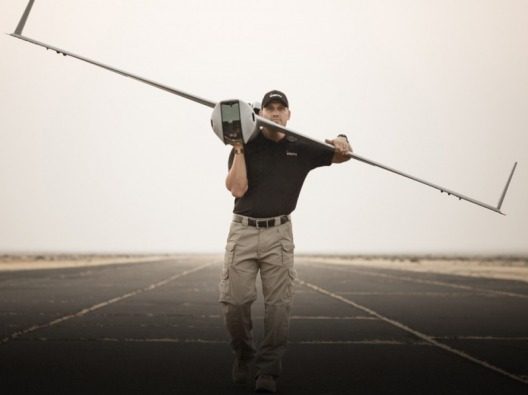Boeing subsidiary Insitu has revealed that its latest advancements in High Accuracy Photogrammetry (HAP) are pushing the theoretical limits of aerial photography at altitude.
Last month Insitu’s latest prototype carried a HAP payload that can capture images accurate to within five centimeters (cm) horizontally and 10cm vertically. Insitu describes this new capability as “ground-breaking”, and says it “now leads the industry in accuracy that can be obtained without ground control from a fixed-wing Unmanned Aerial System traveling more than 100km (62.1 miles) per hour from higher than 1,000 ft.”
Read more: DroneBase & Airbus Aerial Partner to Combine Drone and Satellite Imagery

ScanEagle gets an upgrade?
Insitu’s ScanEagle is an ideal platform for the latest HAP technology. More than 150 square kilometers (nearly 60 square miles) can be covered in a single flight, and with the latest HAP payload, imagery with greater accuracy than ever before can be captured.
A HAP payload can be integrated with a Phase One 50 or 100-megapixel camera onto UAS platforms operating as part of Insitu’s INEXATM suite of remote sensing products, information delivery services and solutions for enterprise customers.
The focus for Insitu’s HAP technology is to support mining, oil or gas operations. HAP is ideal for large area surveys required over open cut mining tenements, distributed oil and gas infrastructure, large-scale construction operations, road, rail and pipeline corridors and more.
In remote sensing, the Ground Sampling Distance (GSD) — in a digital photo of the ground from above — is the distance between pixel centers measured on the ground. With recent improvements to Insitu’s HAP payload, accuracies to within two-to-three pixels have been validated.
That means that a 3cm GSD will result in a 3D global accuracy of 6-to-9cm.
HAP provides persistent monitoring
Insitu’s HAP capability provides persistent monitoring and cost-effective inspection of critical assets, capturing the data needed to analyze asset condition. Utilizing HAP, customers optimize operations, and significantly reduce costs through eliminating the need for survey ground control points to achieve survey level accuracy.
The improved positional accuracy derived from the HAP payload provides even better input into data analytics. In the mining industry, HAP will allow fast production of more accurate orthomosaics over a wide area, enabling precise volumetric and stockpile measurements.
In environments with bare earth and limited vegetation, Insitu argue that their HAP payload now represents an alternative to LiDAR, with the ability to produce imagery data as accurate as most LiDAR payloads at a lower cost.
HAP also is available in a multi-spectral format which gives machine learning algorithms the information needed for automated asset inspection, including vegetation encroachment, standing water, infrastructure anomalies, and more.
“Insitu is geared to provide turnkey solutions in aerial data collection and remote sensing, and the increased HAP accuracy we have achieved is an exciting addition to our suite of solutions to drive efficiencies in our customers’ resource sector operations,” said Andrew Duggan, vice president, Insitu Commercial.
“We are excited by the possibilities these innovations in aerial imagery will bring to our customers”.







[…] Boeing subsidiary Insitu has revealed that its latest advancements in High Accuracy Photogrammetry (HAP) are pushing the theoretical limits of aerial photography at altitude. Last month Insitu’s latest prototype carried a HAP payload that can capture images accurate to within five centimeters (cm) horizontally and 10cm vertically. Insitu describes this new capability as “ground-breaking”, and […] The post Insitu’s Photogrammetry Payload Pushes Theoretical Limits of Accuracy appeared fiSee Original Article […]